Whether you’ve been used to eating pickles in sandwiches and burgers or like to stick your hand in the jar and eat them as a snack, many wonder if they can still enjoy this crunchy treat on a ketogenic diet.
Pickles are made with some basic ingredients such as cucumbers, vinegar, and water mixed with salt, making them acceptable to eat for those following a keto diet. However, sweet, candied, and breaded pickles contain added sugars and high-carb ingredients, which should be avoided.
In this article, I’ll go over if all pickles are allowed on a ketogenic diet, the number of carbs in them, other uses for pickles and pickle juice, and some keto-friendly pickle recipes for you to enjoy.
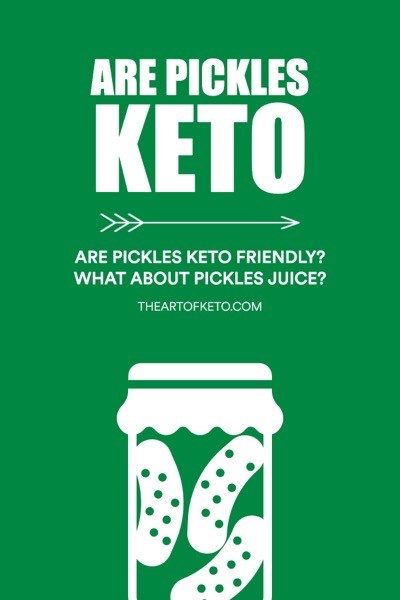
Table of Contents
Are Pickles Allowed On A Keto Diet?
As with most vegetables, pickles are primarily made up of water, and are for the most part, “keto friendly.”
Pickles are essentially cucumbers that have been brined or placed in a vinegar base. Cucumbers are keto-friendly; therefore, pickles are also keto friendly and allowed as part of your keto diet.
If you’re looking for a salty, sour, and crunchy snack while following a ketogenic diet, pickles make a great option, or some pan fried spam, but that's another topic in itself., or some pan fried spam, but that's another topic in itself..
However, not all pickles are created equal.
Sweet and bread & butter pickles are generally marinated in a base with added sugar. Your best bet is to limit or stay away from these two varieties of pickles as they are not as keto-friendly as the other varieties.
Net Carbs In Pickles
Pickles, since they are primarily water, are very low in calories but high in volume. Half of the carbohydrates from pickles come from fiber, thus making them a low-carb option and a great way to get fiber on a ketogenic diet.
One small pickle spear (35g) contains less than one gram of carbohydrate. A single spear has 0.8 grams of total carbohydrates, with almost half (0.3g) of the pickle coming from fiber.
A small pickle spear only has 0.5g of net carbohydrates.
A one-cup serving of kosher dill pickles has 3.7g of total carbohydrates and 1.6g of that coming from fiber.
A one-cup serving of kosher dill pickles has only 2.1g of net carbohydrates.
What Are The Different Types Of Pickles?
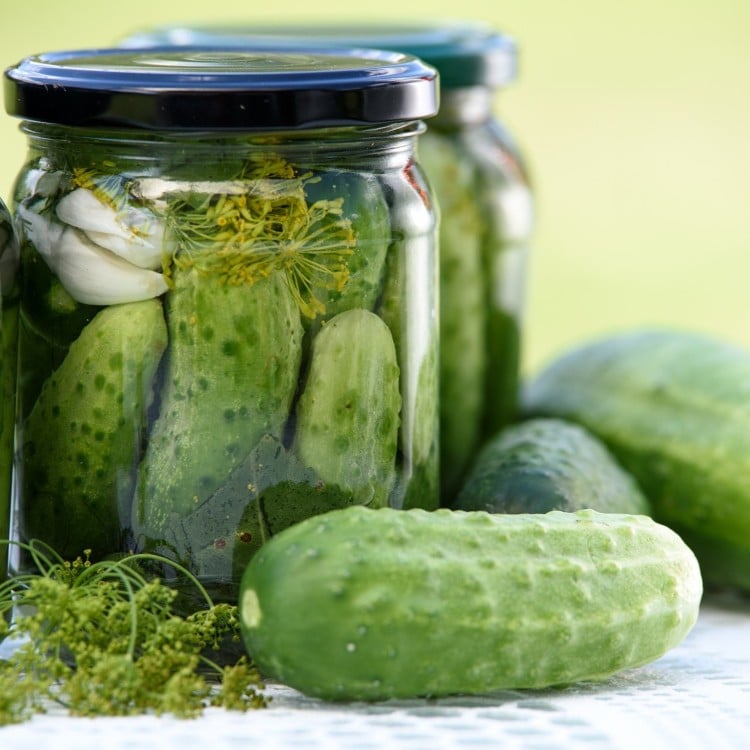
In general, most pickles are made the same way, but the main differences you will find are in size, how they are cut, and the different spices they are marinated in.
Here is a brief explanation of the most popular varieties of pickles you’ll run into at the grocery store.
Dill pickles
Genuine dill pickles are probably the most popular type of pickles you may think of when you hear the word pickles.
Dill pickles get its name from the fact that they’re pickled with dill weed and dill seed.
Dill pickles are generally served whole or vertically sliced.
Kosher dill pickles
When you see or hear the word kosher, this is a term to describe a food that complies with the dietary standards of traditional Jewish law.
To be certified kosher, all the ingredients, even the process, must follow a strict set of biblical laws.
If you’ve ever visited New York, you’re likely to come across these at some of the famous New York Jewish delis, such as Kat’s Delicatessen. https://www.katzsdelicatessen.com/
They are quite famous for their garlic and salt fermented pickles served atop their delicious sandwiches.
Sweet pickles
As the names imply, sweet pickles are… well, sweet.
Added sugar and other spices are generally used when they make sweet pickles.
Bread and butter pickles
Bread and butter pickles are similar to sweet pickles, but with the added ingredients like celery seeds and coriander for a tangier flavor profile.
These are the type of pickles that most fast food establishments use with their burgers and patties.
Gherkin pickles
A gherkin is a small pickle, but not every small pickle is a gherkin, but we’ll leave that distinction to the pickle connoisseurs to argue.
How Much Pickle Juice To Drink On Keto?
In most studies, they used the equivalent of 2-3 oz of pickle juice, which is half a glass of wine or a double shot of hard liquor.As gross as this may sound to specific individuals, some people drink pickle juice straight or mixed with other beverages.
If you’ve heard of a dirty martini, it’s generally made with olives and a splash of olive juice, but some people opt for some pickles and pickle juice instead.
Aside from mixing it with alcohol, or if you enjoy the taste, there may be more than one reason why people on a ketogenic diet may drink pickle juice.
Helps with muscle cramps
When starting a ketogenic diet, many individuals find themselves suffering from muscle cramps.
Muscle cramps on a ketogenic diet is usually a result of dehydration and an electrolyte imbalance. Within the first week or two of starting a ketogenic diet, you may notice that you are urinating more frequently.
As you begin to expel more and more water, you also get rid of vital electrolytes, which help regulate fluid balance, more specifically sodium and potassium.
Pickle juice is high in sodium, but also has some potassium, which is why drinking pickle juice can relieve muscle cramps quickly.
Athletes have been using this trick for decades.
May help regulate blood sugar levels
Some research suggests taking apple cider vinegar may reduce glucose spikes. 1
Another study by the Journal of Diabetes showed that vinegar helped regulate blood sugar levels in type 2 diabetics post-meal. This is huge as many individuals following a ketogenic diet also have type 2 diabetes or are pre-diabetic. 2
Helps with weight loss
While drinking pickle juice won’t cause you to lose weight directly, pickle juice, because of the vinegar, may help suppress appetite. 3 4 5
Contains antioxidants
Pickle juice is rich in both Vitamins C and E, which are potent antioxidants that help the body from free radicals.
Boosts gut health
Fermented foods such as Kimchi, sauerkraut, and pickles are good for your digestive system. The probiotics contained in fermented foods, like kimchi, encourage the growth of good bacteria and flora in your gut.
Probiotics have also been shown to:
- Improve digestive health 6
- Reduce anxiety and depression 7
- Promote heart health 8
Helps freshen breath
You must be saying…
Wait a minute! How can pickle juice freshen your breath?
Pickle juice, more specifically the dill and vinegar have antibacterial properties. Your mouth is a breeding ground for bacteria and a primary suspect for bad breath.
Pickle juice can help freshen your breath by killing off the harmful bacteria, thus leaving your breath fresh once again.
Keto Friendly Pickles Recipes?
Need some keto-friendly pickle inspiration? Try some of these pickle recipes, sure to fill your cravings.
Keto air fryer fried pickles
One of my favorite keto-friendly pickle recipes, these pickles are coated with pork rinds and air fried for a crunchy treat. These make for the perfect keto snack or party appetizer.
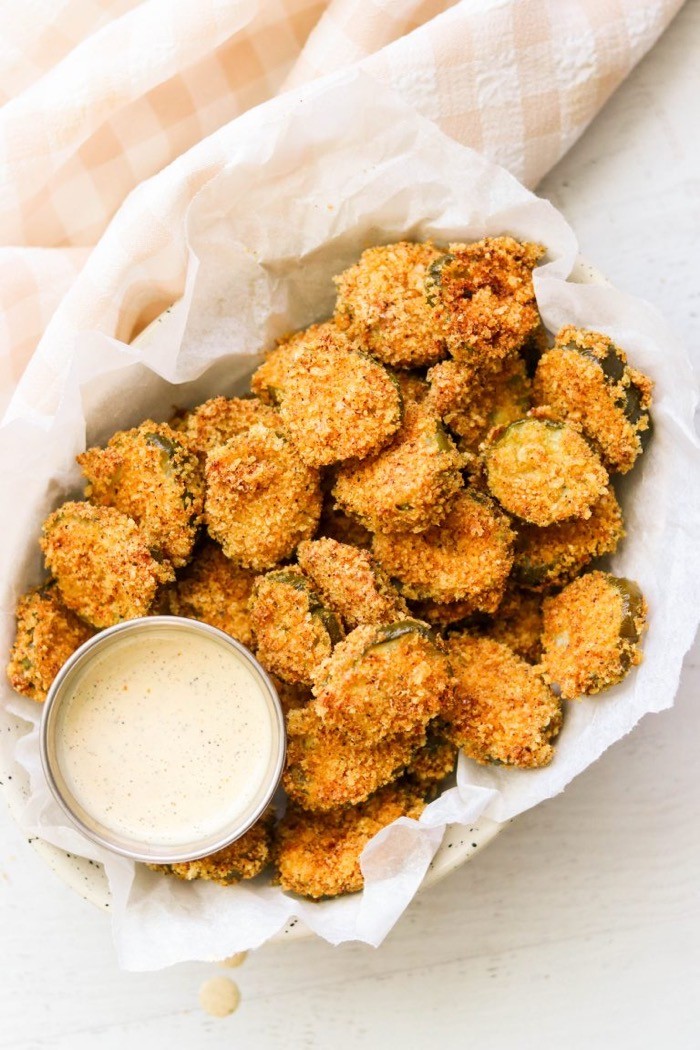
Photo and recipe courtesy of What Great Grandma Ate
Bacon-wrapped pickles
How can you go wrong with bacon or turkey bacon anything? Try this recipe for a super simple keto friendly pickle snack bacon
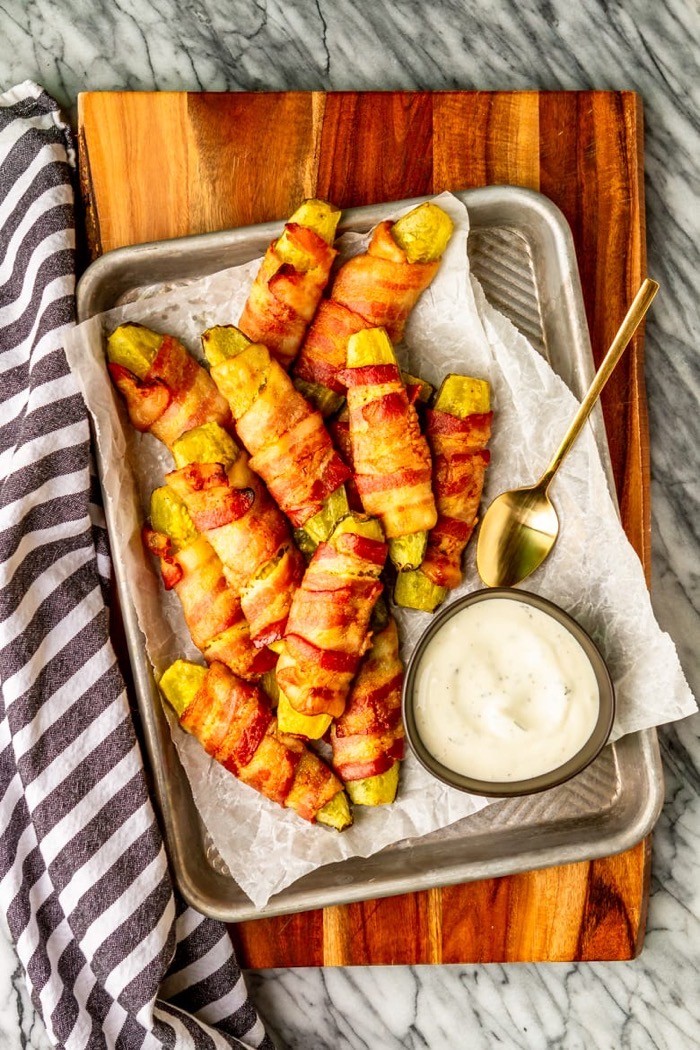
Photo and recipe courtesy of Unsophisticook
Low carb keto sweet & spicy pickles
While store-bought sweet pickles may not be keto friendly, this recipe IS keto friendly.
For those of you that like to have your go in the kitchen, here is a recipe for you.
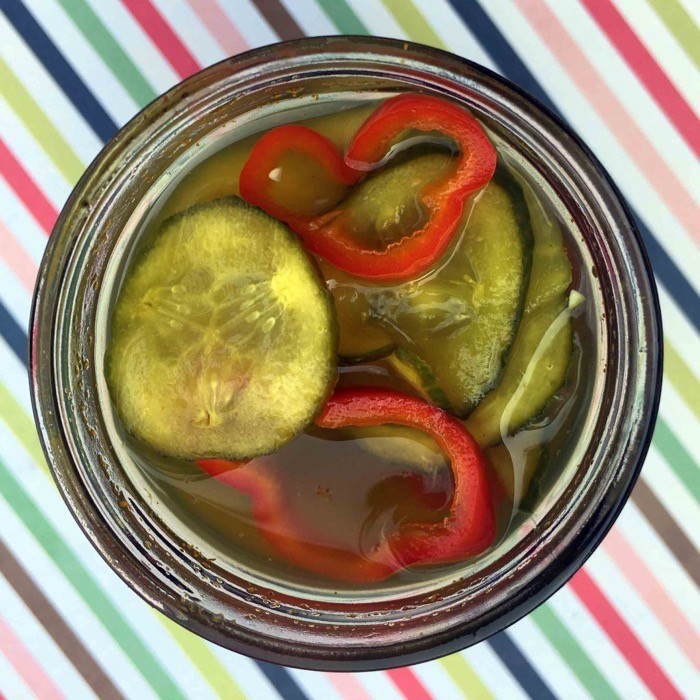
Photo and recipe courtesy of Resolution Eats
The Takeaway
Pickles AND pickle juice are not only keto friendly but may offer other health benefits as well.
While you should generally stay away from sweet and bread&butter pickles, there are keto-friendly recipes that you can use to make them in the comfort of your own home.
If you suffer from cramps, especially at the beginning of a ketogenic diet, pickle juice is a great way to alleviate them quickly.
